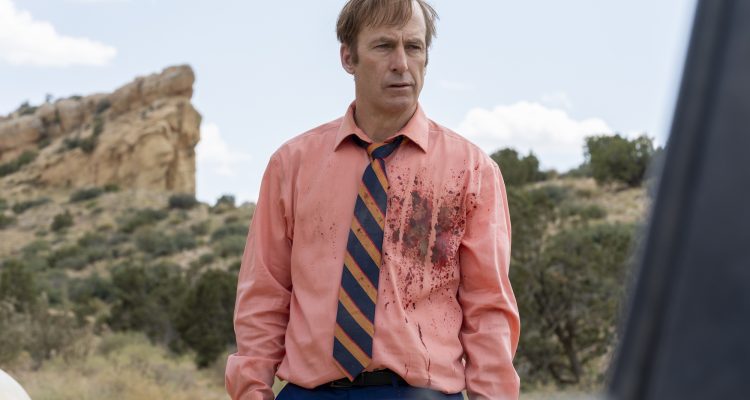“The hardest thing for me was to play the naiveté of Jimmy as a younger person, where he starts in the series,” Bob Odenkirk says of his multifaceted character. “You could say he’s become more cynical, but really, it’s self-awareness and I love that.”
Actor, writer, and producer Bob Odenkirk is incredibly articulate when it comes to discussing the nuances between the characters of Jimmy McGill, Saul Goodman, and Gene at Cinnabon. Odenkrik’s meticulous devotion to his work is something that’s shared by his Better Call Saul castmates; a devotion that has resulted in the finest season of the series to date and significant momentum going into this year’s Emmys.
Odenkirk’s path to becoming an award-winning dramatic actor in his fifties is one of the more inspiring Hollywood tales you’ll find. It’s also something the talented writer never considered when he got his start in sketch comedy.
Odenkirk rose to prominence quickly, earning two Emmy awards as a writer for SNL (1989) and The Ben Stiller Show (1993). His follow up endeavor was co-creating and starring in HBO’s critically lauded Mr. Show, opposite frequent collaborator David Cross.
Odenkirk’s career weaves through genres like a tapestry imagined by Salvador Dalí. As a comedic actor and writer, Odenkirk highlights his time performing “Motivational Speaker” opposite Chris Farley at Chicago’s Second City as one of the most rewarding periods of his creative life. Odenkirk wrote the sketch and polished it with Farley long before the legendary SNL interpretation. The late Phil Hartman plays Odenkirk’s role in the below video.
From the moment Saul Goodman arrived on Breaking Bad, audiences were drawn to the sleazy lawyer and his cringeworthy commercials. Odenkirk imbued the character with that extra, undefinable quality which left us wanting more, and thankfully Vince Gilligan and Peter Gould delivered with the prequel series.
Odenkirk is a two-time Critic’s Choice winner for his work on Better Call Saul, as well as a four-time Emmy nominee for lead actor in a drama series. His dramatic portfolio also includes the brilliant first season of Noah Hawley’s Fargo (2014) and playing reporter Ben Bagdikian for Steven Spielberg in the Oscar nominated film The Post (2017).
Awards Focus spoke to Odenkirk about the drastic evolution of Jimmy’s relationship with Kim (Rhea Seehorn), Jimmy’s struggles with PTSD following the desert shootout, and life behind the scenes with his Albuquerque roommates.
Awards Focus: In interviewing your castmates, we’ve heard a lot of praise for your work. What stands out to you as a highlight for this season?
Bob Odenkirk: Well, we had a great season overall. But my favorite thing is the way Jimmy learns about himself and exhibits this sense of self-awareness. It’s great because the hardest thing for me was to play the naiveté of Jimmy as a younger person, where he started in the series. You could say he’s become more cynical, but really, it’s self-awareness and I love that. On the other hand, what he does with that self-awareness isn’t too good. He has these realizations about himself, but they give him an outlet to become ethically unmoored.
AF: Well, it’s funny because Kim, who seemed to know exactly who she was in previous seasons, looks like she’s losing herself. Does Jimmy worry that he’s opened Pandora’s Box?
Odenkirk: It’s a very strange thing, that last conversation. Because at first, you’re probably thinking that Kim’s just trying to make him feel less alone. Maybe she’s just trying to have some fun, make some gentle light out of those dark instincts Jimmy has. Or maybe she does it to make him feel a sense of his own limitations. But then those theories seem to fall flat, because Jimmy says, “Let’s slow down.” And she’s like, “No, no, no, let’s keep going.”
And she seems to genuinely mean it, to have some genuine delight in hurting Howard, who doesn’t really deserve it. Whereas Jimmy obviously pulls some crazy stunts, but those are more childish, almost like a teen prank.
AF: In talking to Jonathan Banks, we learned that he disagreed with the writers on some of Mike’s choices and he told them so. Do you have points where you’ve given the writers some pushback on Saul’s actions?
Odenkirk: Honestly, yes. There are moments where I say that “I think this is too far,” or that I don’t understand the choice. And most of the time, we’ll have a conversation where we come to some understanding on the story direction, which is to say I compromise (laughs).
After all this time, I like this character. I want him to make the right choices, almost like a friend. But sometimes the answer from Peter Gould is simply, “He’s not your friend, and he doesn’t make the right choices. That’s the story we’re telling. You don’t have his ear.”
And in the end, we know how those choices pan out. We’ve seen Breaking Bad and the road Saul takes.
AF: Yet there’s so much we don’t know, the arcs of other characters that have yet to be answered. Mike gives Jimmy a great speech about being on a specific road and not being able to get away from it. What road do you think Kim is on, going into season six?
Odenkirk: Well, I gotta say, when you see that last moment of season five, you get a glimpse at one of the core elements of the story. Because Saul is no longer asking himself who he is. Now he’s asking, Who is Kim Wexler?
The woman who does that finger-point, gunshot gesture when asked if she’d harm an innocent man, who the hell is she? She’s done these little ethically compromised things, mostly as a team with Jimmy, with a kind of a sense of playfulness and partnership. But now there are real questions as to what’s going on in Kim’s head.
AF: The writers have certainly altered the status quo of the relationship between Kim and Jimmy over the course of season five. How do you navigate that as actors, especially in the context of broader character changes?
Odenkirk: There are definitely specific story choices and plot choices that are challenging to consolidate with the character. The moment where Kim asked Jimmy to marry her is one of those, where Rhea and I both wondered, How do we make this real? It was easier for me because all I had to do was act befuddled, which is how anyone in that situation would feel. It was harder for Rhea.
But I would say the hardest thing for me is when Jimmy’s doing a purely Saul Goodman thing, or doing something vindictive. It’s hard to understand that when you don’t have the instincts or life experience that might lead you down that road.
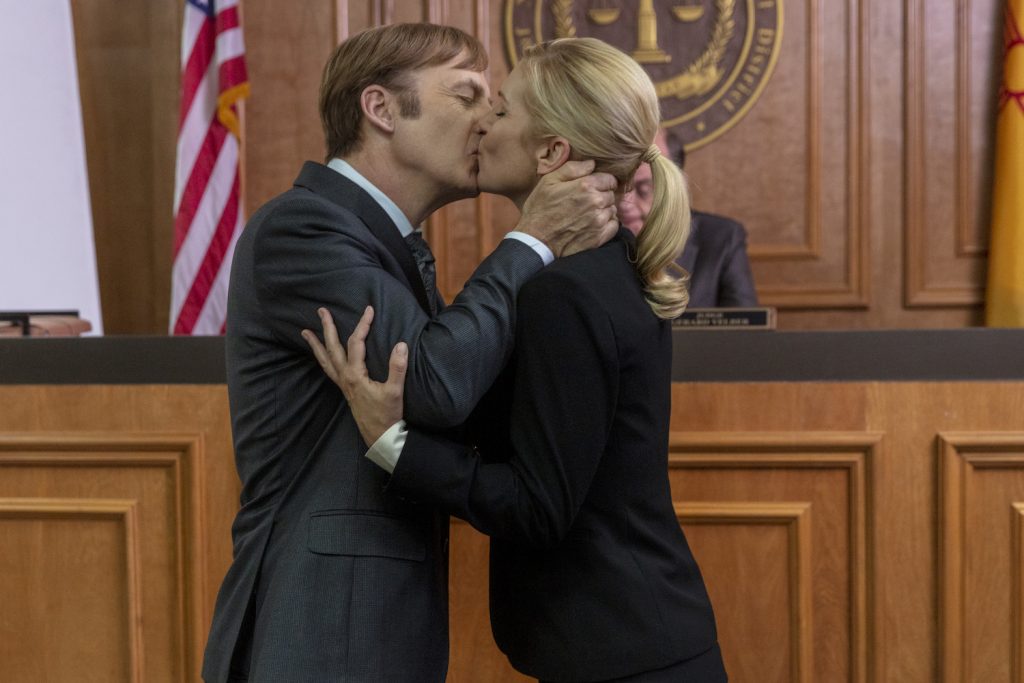
(Photo Credit: Greg Lewis/AMC/Sony Pictures Television)
But that is a testament to the writers, they’ve given the character a sense of that now. Earlier on he would make these bad choices, and he seemed very blind to the ways in which these manipulative things would affect him and the people around him. Now he seems to understand how stuff can backfire. And he’s accepting that, moving forward with a stronger sense of realism. He’s choosing to be Saul Goodman in those moments. He’s more conscious about everything, from adopting the name to the flamboyant shoes and clothes. He’s choosing to play this role in part of his life, to give it a name, and to let that part of his spirit run rampant.
I love that development so much because the young Jimmy, he was hard to play because of his naiveté. As an actor, Saul’s self-awareness is great.
AF: In episode nine, you got to play a Jimmy who is not only physically beaten down from his trek through the desert, but also suffering from PTSD. It’s really unique to see him squirming in front of Lalo. Normally, he’d find something to say, but he’s in this weak state, and it’s just another facet you get to add to the character. The tension in that scene was incredible.
Odenkirk: Thank you. The thing is that Jimmy absolutely knows what’s happening. When Lalo says “Tell it again,” Jimmy knows he’s being played and prodded. He senses the danger, because this ploy can actually work. If you want to catch somebody in a lie, make him tell that story over and over. Jimmy knows what’s happening, but he’s too depleted to use his normal powers of logic twisting, to have the spirited energy for that kind of gamesmanship. But thank God, Kim comes through for him.
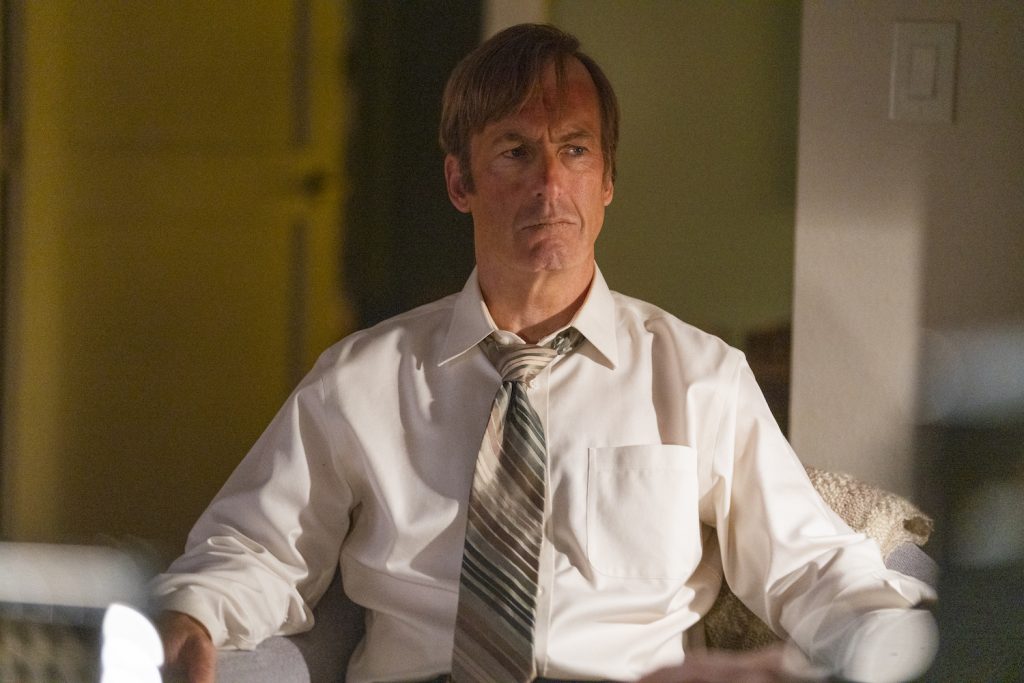
(Photo Credit: Greg Lewis/AMC/Sony Pictures Television)
AF: Lalo’s terrifying in that scene and Tony Dalton brings so much to the character. What do you think’s going on in Lalo’s head as he listens to Jimmy?
Odenkirk: I think that was a tough one for Tony too, I imagine. You know, what’s going on inside that guy’s head who would usually just pull a gun and do it? He doesn’t care about anything.
But partly it might be that he figures he has Kim on his legal team. I mean, why not just keep her, she’s so good. If she’s got the grit and courage to give Lalo a piece of her mind, then she’s a good person to have on board.
AF: Vince Gilligan called episode eight the most challenging episode he’s ever directed. How was that experience?
Odenkirk: Yeah, filming in the desert was a brutal challenge, but even within the brutal challenge there was a kind of joy. I love when we have adventurous and physically demanding sequences. I just love it. One of the fun things about acting is going places that a real person doesn’t get to go very often. If they live their life with some degree of restraint and steadiness, it’s rare for one to find themselves lost in the desert.
AF: During much of their desert trek, Jimmy carries two massive duffel bags filled with cash. Practically speaking, how was it acting with those for multiple days?
Odenkirk: If those bags had been filled with real money, they’d have been 75 pounds each. I don’t think I’d get that far with 150 pounds. Maybe a couple miles, which is a lot less than the distance Mike and Jimmy covered. But the bags were actually 40 pounds each, which is still very heavy. So the physical effort that shows up on the screen is very real.
AF: I’m assuming the heat was the bigger enemy?
Odenkirk: It was nightmare heat. And of course, you’re playing things over and over again. And Vince is an extremely thorough director who is shooting multiple, multiple takes from every angle. But it all worked out, because my suffering was essentially the character’s suffering. I was all for that stuff, as long as it was safe. When you have such a big crew and you’re out in the middle of nowhere with temperatures that high, it’s genuinely dangerous. It took a few days to bring in enough safety equipment to keep everybody on the crew cool. It’s definitely a bonding experience to take on something that big together and Vince did a wonderful job of shooting.
He could have made a two hour episode if he’d indulged himself with the amount of cool footage we got. But him condensing that, it was even more impactful that way.
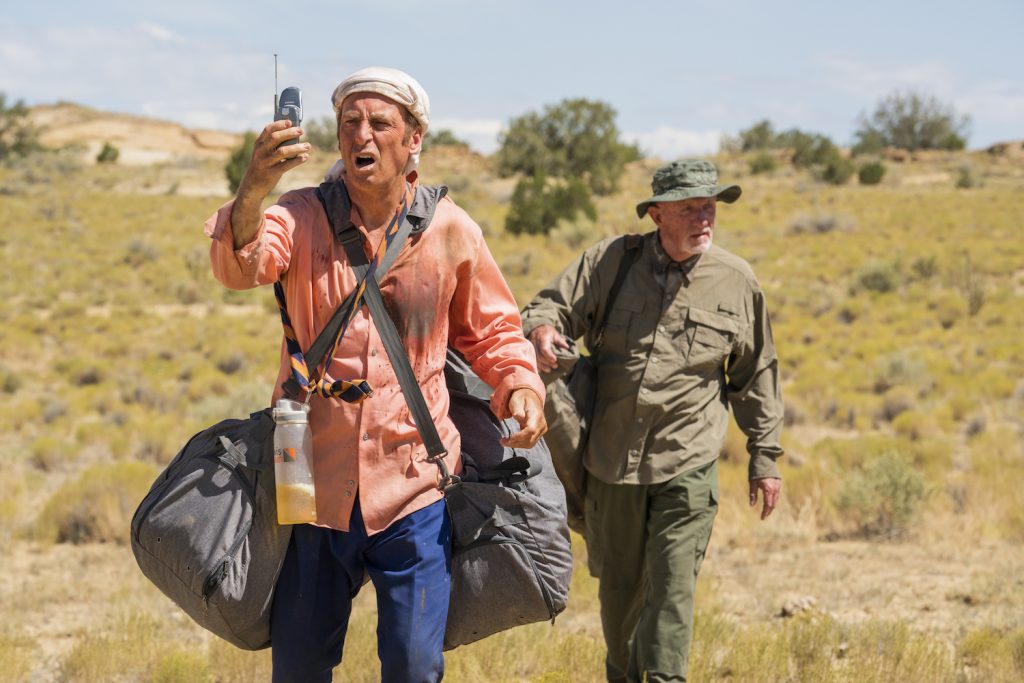
AF: This was a deeply dramatic season with some dark plots, but there was some comedic relief, like the cell phone tent scene. Is it as refreshing for you to perform those moments as it is for the audience to see them?
Odenkirk: Oh man, I have so much fun. I get really silly, and I really try to push it to the point where the writers want to tell me to pull it back a bit. But they wrote the character, and he’s a silly character, so I go with that. My trick is to go as far as I can, but try to sell it to an audience. For example, last season, I was at the grave pretending to feel at the one-year anniversary of Chuck’s death, because I know some of his law partners will come around to plant flowers and I want them to see me grieving. So I’m at the grave pretending to grieve and I’m actually saying “boohoo” as I cry. But I do it in such a way that someone approaching wouldn’t quite hear the word “boohoo.” I take these moments that the writers give me and push them as far as I can, because it’s really fun.
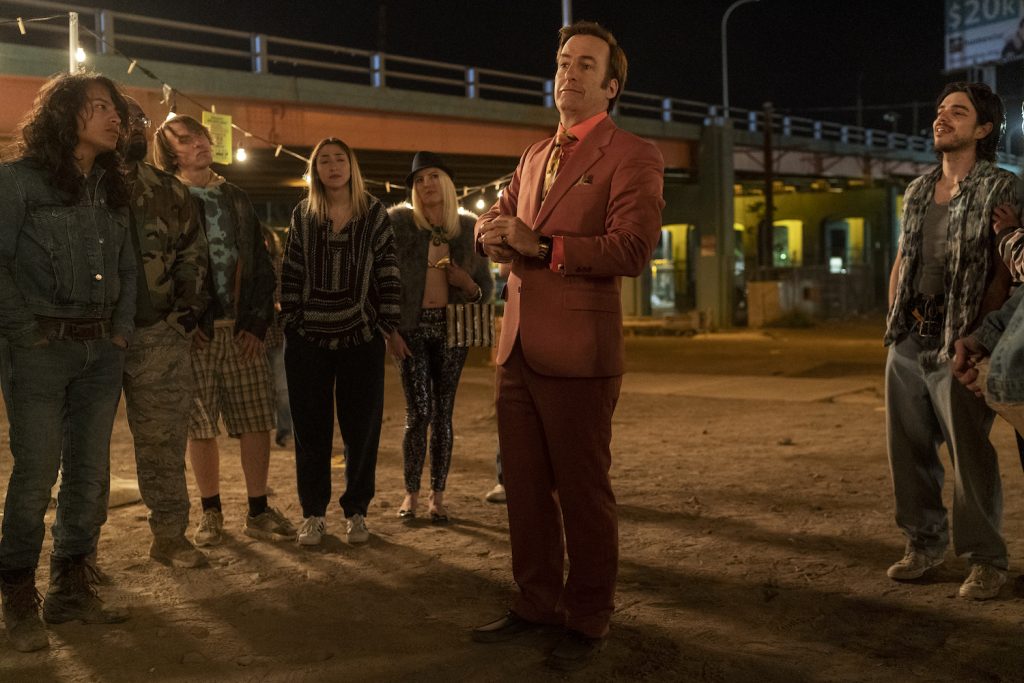
(Photo Credit: Warrick Page/AMC/Sony Pictures Television)
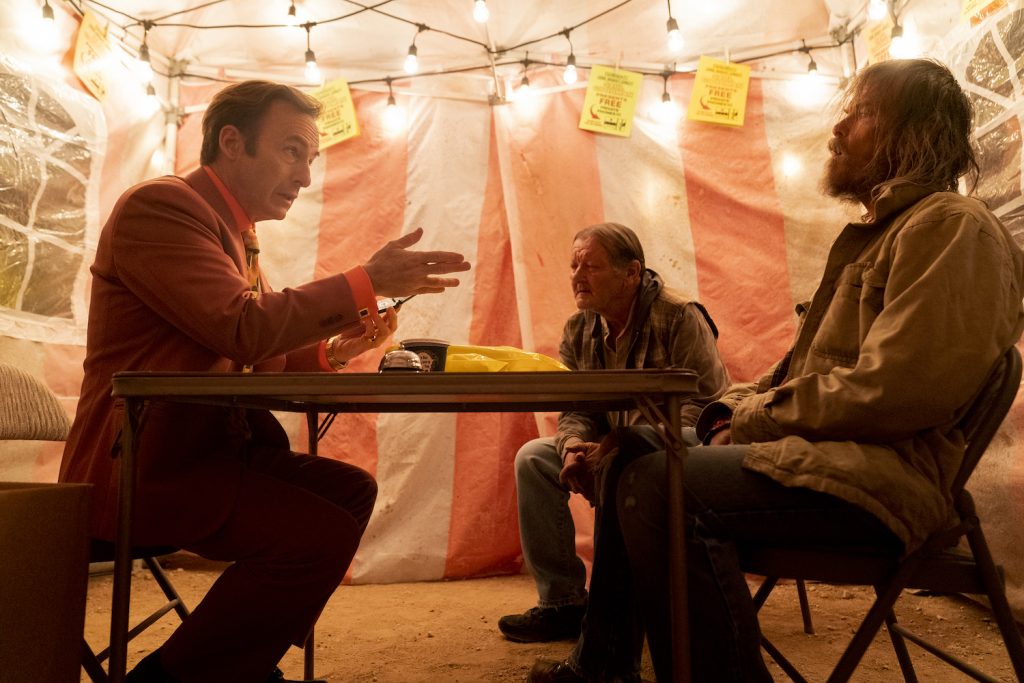
AF: One particularly funny moment featured Jimmy, a stunned Everett Acker (Barry Corbin), and a picture of a man having sex with a horse. What did you think when you read that, did you play around with various animal punchlines?
Odenkirk: No, we didn’t. It was written exactly that way and, in my opinion, it was perfect. By the way, Barry Corbin, who played Everett, is an absolutely great actor. I saw him in No Country for Old Men just the other day, and man, he’s great. I loved the absurdity of that horse picture scene. Jimmy knows how to rope in a client (laughs).
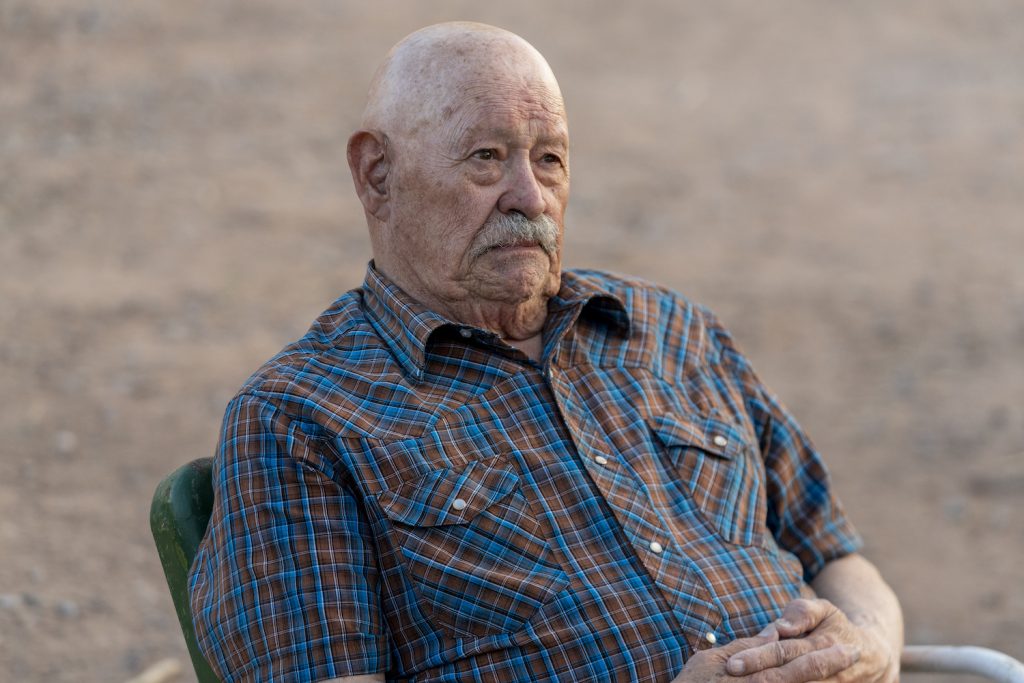
(Photo Credit: Greg Lewis/AMC/Sony Pictures Television)
AF: In terms of career highlights, the original Second City incarnation of “Motivational Speaker” turns thirty-years-old this summer. The sketch is quintessential viewing for any SNL fans and still gaining new fans to this day. As brilliantly as Chris Farley performs the role, could you imagine anyone reinterpreting Matt Foley? Perhaps the father invites Jonathan Bank’s Mike Ehrmantraut over for the pep talk.
Odenkirk: Yeah, but instead of telling the kids you’ll live in a van down by the river, I think he’d be threatening them with you’ll end up being a murderer for hire.
AF: Living in a truck in the desert?
Odenkirk: You’ll find yourself out in the desert alone, trying to shoot eight guys who have submachine guns aimed at you.
Jacob Romines contributed to this article.


